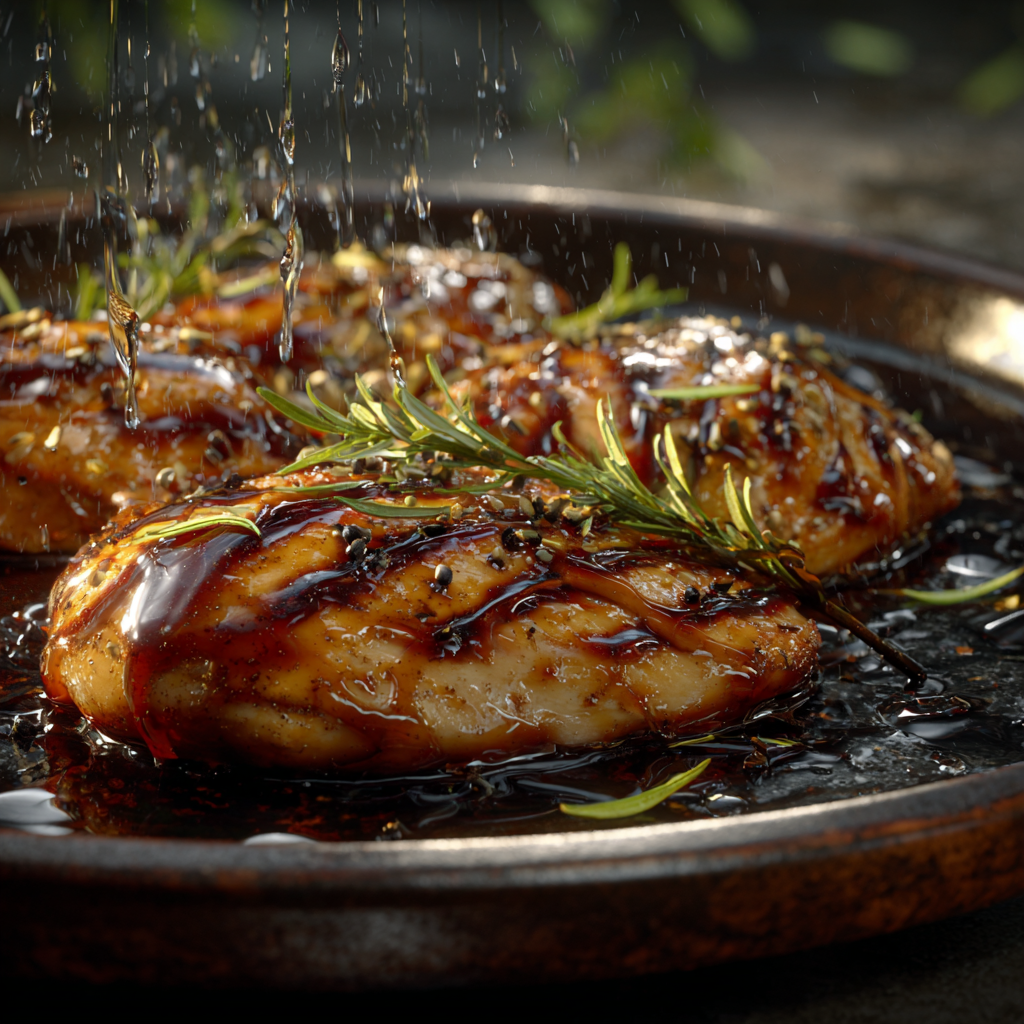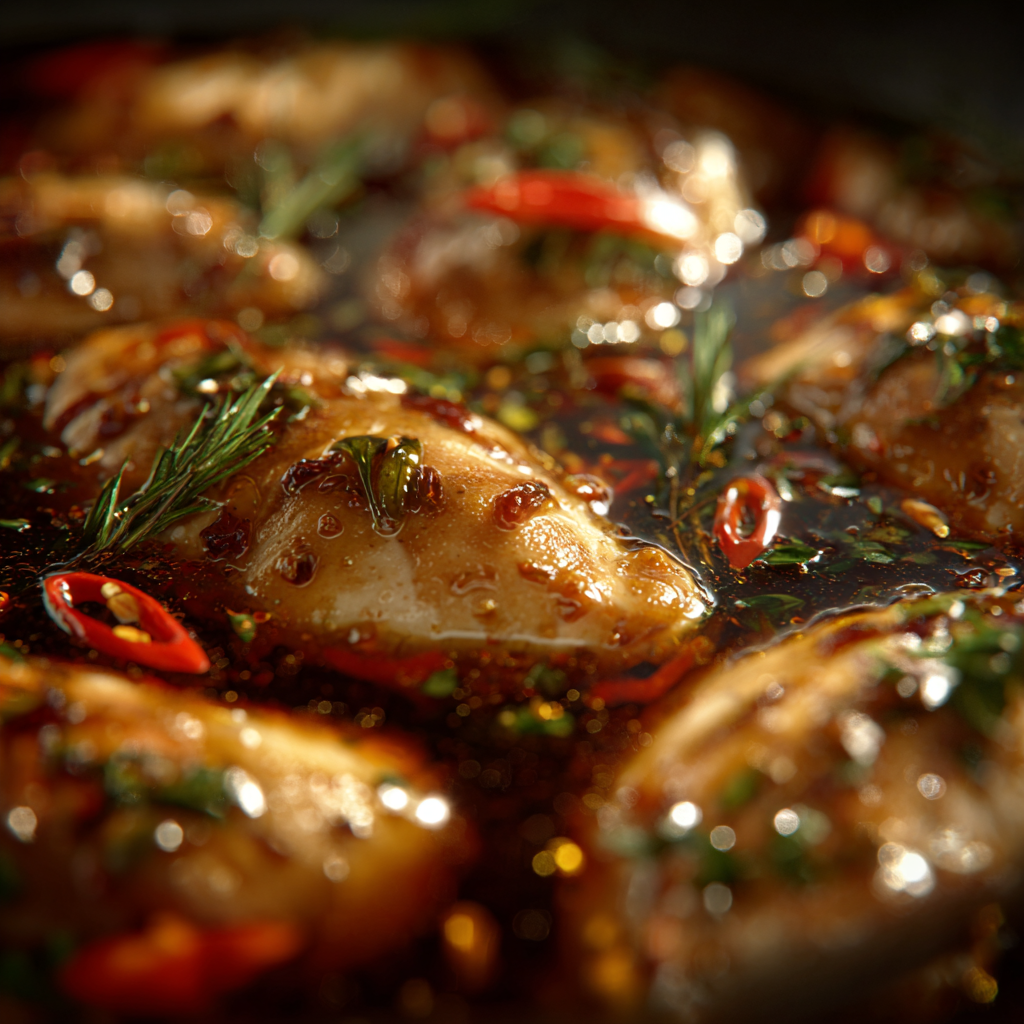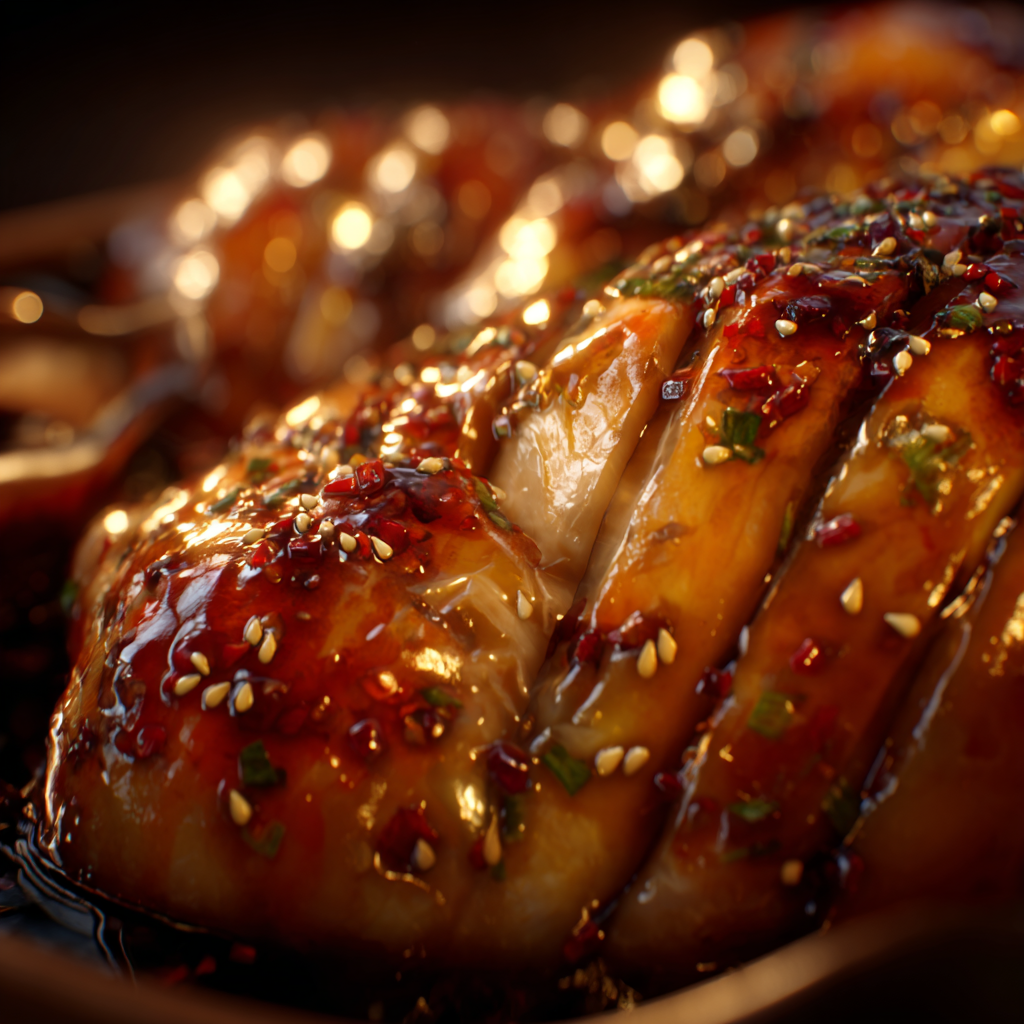
Why You Should Try a Soy Sauce Marinade for Chicken
I love cooking chicken. It’s versatile, healthy, and always a crowd-pleaser. But plain chicken? Boring. That’s where a soy sauce marinade for chicken comes in. It adds flavor without much effort.
A good marinade transforms chicken from bland to bold. I’ve tested many recipes. Soy sauce stands out every time. Why? It’s salty, savory, and enhances other flavors. Plus, it tenderizes the meat.
Can You Marinate Chicken with Soy Sauce?
Yes, you can marinate chicken with soy sauce. It’s one of the easiest ways to add depth to your dish. The key is balance. Too much soy sauce can overpower. A little goes a long way.
Here’s what I do:
- Mix soy sauce with olive oil or sesame oil.
- Add minced garlic and ginger for kick.
- Toss in a splash of lemon juice or vinegar.
This combo creates a rich base. It works for grilled, baked, or pan-seared chicken.
How Long Can Chicken Marinate in Soy Sauce?
Time matters when marinating chicken. Leave it too short, and the flavor won’t sink in. Leave it too long, and the meat can turn mushy.
For a soy sauce marinade for chicken, 30 minutes is the minimum. I aim for 2 to 4 hours. Overnight works too, but don’t exceed 12 hours. Acidic ingredients like vinegar speed up the process. If your marinade has them, reduce soaking time.
The Basic Marinade Formula for Chicken
Every great marinade follows a simple formula. Here’s mine:
- Oil: Adds moisture and helps distribute flavors.
- Acid: Lemon juice, vinegar, or yogurt tenderizes the meat.
- Salt: Soy sauce covers this perfectly.
- Sweetener: Honey or brown sugar balances saltiness.
- Spices: Garlic, pepper, or herbs add personality.
Stick to this formula, and you’ll never go wrong. Adjust ratios based on taste.
What’s a Good Marinade Sauce for Chicken?
If you’re new to marinating, start simple. A soy sauce marinade for chicken is foolproof. Here’s my go-to recipe:
- 1/4 cup soy sauce
- 2 tablespoons olive oil
- 1 tablespoon honey
- 2 cloves garlic, minced
- 1 teaspoon fresh ginger, grated
Whisk everything together. Pour over chicken. Let it sit. This mix is sweet, salty, and aromatic—perfect for any occasion.
Feel free to tweak it. Add chili flakes for heat. Swap honey for maple syrup. Use lime juice instead of lemon. Experiment until you find your favorite.
Tips for the Best Results
Marinating seems easy, but small details make a big difference. Here’s what I’ve learned:
- Use a resealable plastic bag or covered dish. It prevents leaks.
- Pat chicken dry before marinating. Excess moisture dilutes flavors.
- Flip the chicken halfway through. Even coating = even flavor.
- Don’t reuse marinade. It’s unsafe once it touches raw meat.
One more tip: let chicken rest after marinating. Take it out of the fridge 15–20 minutes before cooking. This ensures even cooking.
My Favorite Way to Serve Soy Sauce Chicken
I often grill chicken marinated in soy sauce. The charred edges soak up the flavor. Pair it with steamed rice and veggies for a complete meal.
Sometimes, I shred the cooked chicken. Toss it into salads or wraps. Leftovers? Chop it up for fried rice. Versatility is another reason I love this marinade.
Once, I served soy sauce chicken at a family dinner. Everyone raved about it. My cousin even asked for the recipe. That’s how I knew it was a winner.
Common Mistakes to Avoid
Even pros mess up sometimes. Here are mistakes to watch for:
- Using too much soy sauce. Balance is key.
- Skipping acid. It tenderizes and brightens flavors.
- Over-marinating. Stick to the recommended times.
- Not seasoning after cooking. A pinch of salt or pepper finishes the dish.
Learn from my errors. Once, I left chicken in soy sauce overnight. It turned gray and mushy. Lesson learned.
Final Thoughts Before You Start
A soy sauce marinade for chicken is a game-changer. It’s quick, tasty, and works for any skill level. Whether you’re grilling, baking, or stir-frying, this marinade delivers.
Give it a shot. Adjust spices to match your taste. Share your results with friends or family. Trust me—they’ll thank you.

Why Soy Sauce Marinade for Chicken is a Game-Changer
Let me tell you something—soy sauce marinade for chicken is one of those flavor bombs that just works, every single time. Whether you’re grilling, baking, or even pan-searing, this marinade has the power to transform plain old chicken into something extraordinary. I remember one summer barbecue where I was running low on ideas. All I had was a bottle of soy sauce, some garlic, and a bit of honey. You know what? It turned out to be the star of the meal. People kept asking, “What’s in this?” Funny enough, it was just three ingredients.
Here’s the thing: soy sauce isn’t just salty—it’s umami-packed. That deep, savory flavor can elevate even the simplest cuts of chicken. But don’t just take my word for it. The secret lies in how soy sauce interacts with other ingredients. For instance, if you pair it with something sweet like honey or brown sugar, it balances out the saltiness perfectly. Or, if you’re feeling adventurous, try adding ginger or sesame oil for an Asian-inspired twist. Speaking of twists, have you ever tried combining soy sauce with balsamic vinegar? It’s unexpected but totally delicious.
How Long Should You Marinate Chicken in Soy Sauce?
Now, here’s a question I hear all the time: How long can chicken marinate in soy sauce? Honestly, it depends. If you’re using a simple marinade with soy sauce as the base, 30 minutes is usually enough to infuse some flavor. But if you’ve got time, let it sit for a couple of hours—or even overnight. Just don’t go overboard. Marinating chicken in soy sauce for too long (like more than 24 hours) can make the meat overly salty and mushy. Trust me, I learned this the hard way once when I forgot about a batch of chicken in the fridge. Lesson learned!
By the way, timing matters depending on what you’re aiming for. A quick marinade is perfect if you’re short on time, while a longer soak lets the flavors really penetrate. And if you’re worried about the texture, pat the chicken dry before cooking. This little trick helps achieve that golden, crispy exterior we all love.
The Basic Marinade Formula for Chicken
So, what’s the basic marinade formula for chicken anyway? Well, here’s my go-to breakdown:
- Acid: This could be vinegar, citrus juice, or even yogurt. Acids help tenderize the meat and add brightness to the flavor profile.
- Fat: Olive oil, sesame oil, or even melted butter adds moisture and richness.
- Seasoning: Salt (hello, soy sauce!), pepper, herbs, spices—you name it. These are the flavor enhancers.
- Sweetener: A touch of sweetness, like honey, maple syrup, or brown sugar, balances out the acidity and saltiness.
For example, if you’re making a soy sauce marinade, you might mix soy sauce (salt), olive oil (fat), lime juice (acid), and a drizzle of honey (sweetener). Oh, and don’t forget garlic. Garlic makes everything better. Actually, I recently stumbled upon a lemon pepper chicken marinade recipe that uses a similar approach—it’s zesty, tangy, and oh-so-good.
What’s a Good Marinade Sauce for Chicken?
When people ask, What’s a good marinade sauce for chicken?
I always recommend starting with something versatile. Soy sauce is a great foundation because it pairs well with so many other ingredients. But if you’re looking to change things up, there are plenty of options. For instance, have you ever tried a buttermilk marinade for chicken? It’s creamy, slightly tangy, and gives the chicken an amazing tenderness. Or, if you’re in the mood for something bold, a mustard chicken marinade can add a sharp, pungent kick that’s absolutely addictive.
Honestly, the possibilities are endless. One of my favorite combos is soy sauce, grated ginger, minced garlic, and a splash of rice vinegar. Sometimes I’ll throw in a dash of sriracha for heat. It’s simple yet packed with layers of flavor. Another pro tip: add a bit of cornstarch to your marinade. This helps create a sticky glaze when you cook the chicken, locking in all those delicious flavors.
Can You Marinate Chicken with Soy Sauce? Absolutely!
To answer the burning question—Can you marinate chicken with soy sauce?—the answer is a resounding yes. Not only can you, but you probably should. Soy sauce is a kitchen staple for a reason. It’s affordable, widely available, and incredibly versatile. Plus, it works wonders on all types of chicken, from boneless breasts to drumsticks and thighs.
I’ll never forget the first time I used soy sauce as a marinade. I was skeptical at first, thinking it might be too overpowering. But boy, was I wrong. The chicken came out juicy, flavorful, and ridiculously easy to prepare. Since then, I’ve experimented with countless variations. One of my recent favorites includes soy sauce, orange juice, and a sprinkle of chili flakes. It’s sweet, salty, and spicy all at once—a flavor trifecta that’s hard to beat.
Tips for Perfectly Marinated Chicken
Alright, let’s talk practical tips. Marinating chicken sounds simple, but a few small tweaks can make a world of difference:
- Use a resealable bag: Instead of a bowl, toss your chicken and marinade into a zip-top bag. It saves space, reduces mess, and ensures the chicken is fully coated.
- Don’t skip the resting time: After marinating, let the chicken sit at room temperature for about 15-20 minutes before cooking. This helps it cook more evenly.
- Reserve some marinade for basting: Set aside a portion of the marinade before adding raw chicken. You can use it to brush onto the chicken while it cooks for extra flavor.
- Avoid overcrowding: Whether you’re grilling or baking, give each piece of chicken enough space. Overcrowding leads to steaming instead of browning.
Oh, and here’s a random thought—have you ever tried marinating chicken wings in soy sauce and then air-frying them? It’s life-changing. Crispy skin, juicy meat, and tons of flavor. Seriously, you’ve gotta try it.
Experiment and Have Fun
At the end of the day, cooking is all about experimentation. Sure, there are guidelines, but don’t be afraid to get creative. Maybe you’ll stumble upon your own signature marinade. Who knows? Maybe you’ll invent the next big thing. Until then, keep exploring, keep tasting, and most importantly, keep enjoying the process.

Maximizing Flavor: Tips and Tricks for Your Soy Sauce Marinade for Chicken
Let’s be honest—marinating chicken isn’t rocket science, but a few tweaks can make all the difference. I’ve been there, staring at my fridge wondering why my soy sauce marinade for chicken tastes good but not amazing. Turns out, it’s all in the details. Here’s what I learned after years of trial and error.
First off, don’t just dump everything into a bowl and call it a day. Layering flavors is key. Start with your base—a good quality soy sauce—and then think about what else you want to bring to the table. For example, adding a splash of rice vinegar or citrus juice brightens things up. Funny enough, I once forgot to add acid to my marinade, and the chicken felt flat. Lesson learned!
- Balance is everything: Sweetness from honey or brown sugar works wonders with soy sauce’s saltiness.
- Spice it up: Fresh ginger, garlic, or even a pinch of red pepper flakes adds depth without overwhelming.
- Fat matters: A drizzle of sesame oil or olive oil helps distribute flavors evenly.
By the way, if you’re someone who likes experimenting (like me), try swapping regular soy sauce for tamari or coconut aminos. They’re less salty and perfect for those cutting back on sodium. One time, I used tamari by accident, and wow—it was a game-changer.
Timing Is Everything: How Long Should You Marinate?
Here’s the thing about timing: marinating chicken too long can actually ruin it. Yes, you heard me right. Over-marinating leads to mushy textures because enzymes in ingredients like soy sauce break down proteins excessively. So how long should you leave it?
– For thin cuts like chicken breasts or tenders, 30 minutes to 2 hours is ideal.
– Thicker pieces, like bone-in thighs or drumsticks? Aim for 4 to 6 hours, tops.
– Overnight marination? Only if you’re confident in your recipe and keep it refrigerated.
I’ll admit, I’ve pushed the limits before. Once, I left chicken soaking overnight in a soy sauce marinade, thinking more time equals better flavor. Big mistake. The texture turned out weirdly rubbery. Now, I stick to shorter times unless I’m using milder ingredients.
Actionable Tips for Perfectly Marinated Chicken
Alright, let’s dive into some actionable advice that’ll take your soy sauce marinade for chicken to the next level. Here are my top tips:
- Pat dry before cooking: This might sound extra, but removing excess moisture ensures a crispier finish when grilling or pan-searing.
- Reserve marinade for basting: If you boil leftover marinade for a few minutes, it becomes safe to use as a glaze while cooking. Trust me; it amplifies the flavor.
- Massage it in: Don’t just toss the chicken in the marinade—get hands-on! Rubbing it gently ensures every nook and cranny gets coated.
Oh, and here’s a little secret: resting marinated chicken for 10–15 minutes after taking it out of the fridge makes a huge difference. It lets the meat come closer to room temperature, which promotes even cooking. Sounds simple, but it’s often overlooked.
Funny story—I once hosted a barbecue where everyone raved about my grilled chicken. What they didn’t know? I had forgotten to plan ahead and only marinated it for an hour. Talk about beginner’s luck! Still, since then, I always aim for at least two hours whenever possible.
Common Mistakes and How to Avoid Them
We’ve all been there—excited to cook, we rush through prep work, only to end up with lackluster results. When it comes to soy sauce marinades for chicken, here are some pitfalls to avoid:
– Using expired sauces: Old soy sauce loses its punch. Always check expiration dates.
– Skipping aromatics: Garlic, ginger, and herbs aren’t optional—they’re essential for depth.
– Overcrowding the bag: Make sure each piece has enough space to soak up the marinade properly.
On that note, one of my biggest blunders was using plastic bags that leaked everywhere. Since then, I’ve switched to sturdy zip-top bags or glass bowls covered with cling film. Much tidier!
Final Thoughts Before You Get Cooking
If there’s one thing I hope you take away from this, it’s that creating a delicious soy sauce marinade for chicken doesn’t have to be complicated. With a bit of creativity and attention to detail, you can whip up something truly memorable. And hey, if you’re looking for more inspiration, check out these delicious chicken marinade ideas. There’s always something new to try!
In conclusion, whether you’re grilling, baking, or frying, a well-crafted marinade transforms ordinary chicken into something extraordinary. Remember to balance flavors, respect timing, and trust your instincts. Happy cooking!

Frequently Asked Questions About Soy Sauce Marinade for Chicken
Can you marinate chicken with soy sauce?
Absolutely! Soy sauce is a fantastic base for marinades due to its savory umami flavor. Just remember to balance it with other ingredients like sweetness or acidity to avoid overpowering the dish.
How long can chicken marinate in soy?
For optimal results, marinate chicken in soy sauce for 30 minutes to 6 hours, depending on the cut. Avoid going beyond 12 hours, as extended exposure can alter the texture negatively.
What is the basic marinade formula for chicken?
A basic marinade includes three components: acid (like lemon juice or vinegar), fat (such as olive oil), and seasoning (soy sauce, herbs, spices). Adjust ratios based on personal preference.
What’s a good marinade sauce for chicken?
A mix of soy sauce, minced garlic, grated ginger, honey, and sesame oil creates a versatile and flavorful marinade. Feel free to customize with additional spices or herbs.
Do I need to rinse off the marinade before cooking?
Nope! There’s no need to rinse unless you prefer a less intense flavor. Simply pat the chicken dry to achieve a better sear during cooking.
Can I reuse leftover marinade?
Only if you boil it first. Raw marinade contains raw juices from the chicken, so heating it kills bacteria and makes it safe to use as a sauce or glaze.
Does marinating chicken make it juicier?
Yes, marinating infuses moisture and flavor into the meat, especially when done correctly. However, over-marinating can have the opposite effect.
Is it okay to freeze chicken in a marinade?
Definitely! Freezing chicken in a marinade locks in flavor and tenderizes the meat further. Just thaw it safely in the fridge before cooking.
Can I substitute soy sauce with another ingredient?
Sure! Tamari, coconut aminos, or Worcestershire sauce are great alternatives. Keep in mind their flavor profiles may differ slightly.
Why does my chicken taste too salty after marinating?
This usually happens when the marinade has too much soy sauce or salt. Dilute future batches with water or reduce the amount of soy sauce to prevent this issue.

Soy Sauce Marinade for Chicken
Ingredients
Equipment
Method
- In a bowl, whisk together soy sauce, olive oil, honey, minced garlic, and grated ginger until well combined.
- Pour the marinade over the chicken in a resealable plastic bag or a covered dish.
- Ensure the chicken is fully coated with the marinade and seal the bag or cover the dish.
- Let the chicken marinate for 30 minutes to 6 hours, but no more than 12 hours.
- Remove the chicken from the marinade and pat dry before cooking.
- Cook chicken as desired (grilling, baking, or pan-searing).
